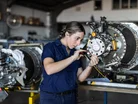Revolutionising Aerospace Manufacturing to Bridge Skills Gap

The aerospace industry occupies a unique position in global manufacturing, forced to navigate urgent calls for increased sustainability, alongside unprecedented demand for new aircraft. The Royal Aeronautical Society surveyed the aerospace manufacturing industry, finding sustainability as the second biggest issue it faces.
But as Airbus secured a record-breaking deal for 500 planes last summer amidst significant industry-wide order backlogs, the most pressing issue for aerospace manufacturing remains the urgent need for more skilled workers and that is making building our future aircraft even more difficult.
Closing the skills gap in aerospace manufacturing
In the United States there are over 800,000 job openings in aerospace manufacturing with 55% remaining unfilled. In Europe, skills shortages led to three in ten manufacturing firms reporting production constraints in the second half of 2022. As the demand for increased innovation and production soars there must be a change in direction and technology is taking centre-stage.
Onboarding new production staff using traditional training methods takes up valuable time and resources from manufacturing. Yet, a combination of classroom theory, exams and on-machine machine training is expensive and time-intensive. Aziz Tahiri, Vice President for Global Aerospace & Defence at Hexagon Manufacturing Intelligence, says that as the skills gap continues to widen, the industry must adopt a more efficient, precise and innovative approach to training by embracing new technologies.
Tahiri believes that training is not the only antidote to the skills gap, as there is a growing understanding that current working practices in the industry need to be re-evaluated to ensure production demands can be met and done so sustainably.
“There are several emerging smart manufacturing technologies that will play a pivotal role in helping the industry to bridge the skills gap and evolve to deliver the rapid innovation required,” he says.
Automation in aerospace manufacturing
The use of technology and machines to automate the performance of specific tasks without the need for human intervention – plays a key role in enabling innovation and bridging the skills gap.
“Tasks that were once repetitive, time-consuming, and often resource intensive, such as elements of quality inspection, can now be efficiently carried out by automated systems such as PRESTO,” says Tahiri. “This frees up valuable time for employees, who can be reallocated to where they are needed most and ensures resource usage is optimised throughout the entire workflow to help improve sustainability.”
Growing accessibility of machine learning for manufacturers is making it easier for them to look into existing and new data throughout their manufacturing processes and find areas for improvement.
“As the industry still struggles with an ever-present communicative gap between the design and manufacturing teams, using data-driven insights offers a solution, helping to develop new and more efficient ways of working collaboratively,” adds Tahiri. “This will free up time at both the design and manufacturing stages that can be spent on high-value and innovation-based tasks, leading to perpetual efficiency gains.”
Using AI to co-pilot manufacturers
Specialised AI can also offer real-time feedback and direction to workers through ‘co-pilot’ technologies.
“These context-aware assistants can act as an advisor to employees as they are going about their work – a far cry from generic AI chatbots, they learn from highly relevant datasets to understand the task in hand,” says Tahiri. “For example, this can ensure the knowledge of retiring CNC programmers is captured within the business, as a ‘co-pilot’ that provides guidance built on their legacy knowledge to new recruits.”
The aerospace industry faces significant challenges, but there is potential for growth and innovation. By incorporating these technologies into training and onboarding, the manufacturing industry can reach for the stars as it tackles contemporary aerospace challenges with risk-free hands-on experience.
******
Make sure you check out the latest edition of Manufacturing Digital and also sign up to our global conference series - Procurement & Supply Chain 2024 & Sustainability LIVE 2024
******
Manufacturing Digital is a BizClik brand.
- Schneider Electric's Commitment to Sustainable ManufacturingSustainability & ESG
- Lenovo & Saudi Alat Building Green Manufacturing FacilitySustainability & ESG
- Nissan Brings Biodiversity to the Factory through RewildingSustainability & ESG
- Capgemini: Gen AI Cause of Spiking Semiconductor DemandAI & Automation


